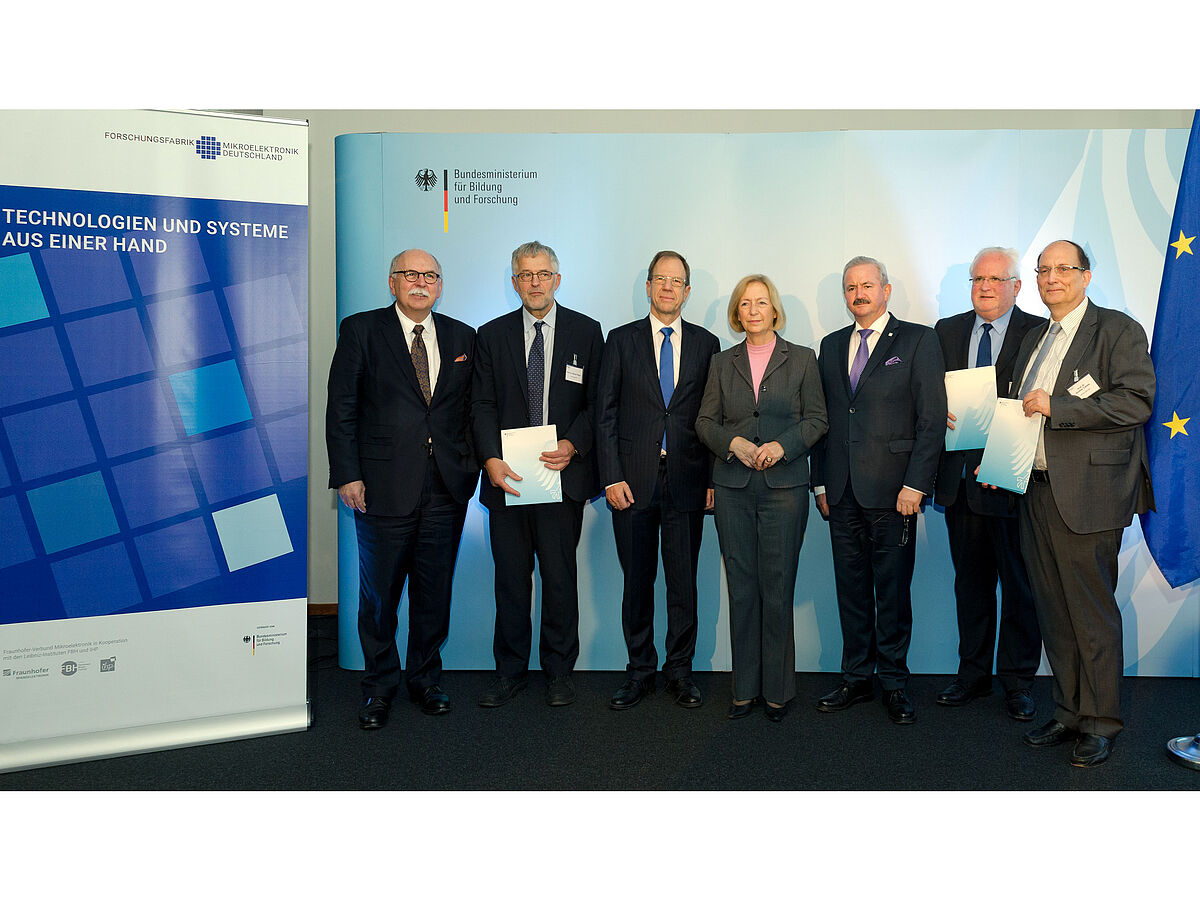To reinforce the position of Europe’s semiconductor and electronics industry within global competition, eleven institutes within the Fraunhofer Group for Microelectronics have, together with two institutes within the Leibniz Association, come up with a concept for a cross-location research factory for microelectronics and nanoelectronics. The Federal Ministry of Education and Research (BMBF) is providing support with the necessary investment. On April 6, 2017, Research Minister Professor Johanna Wanka handed over the grant approvals – 280 million euros for Fraunhofer and 70 million euros for Leibniz.
Research and development across several locations for the first time
For more than 20 years, the Fraunhofer institutes within the Group for Microelectronics and the Leibniz institutes involved have supported German industry with application-oriented research and development for high-tech products. In order to be able to offer even smaller companies top technology under optimum conditions, eleven Group institutes, as well as the Leibniz Institute for Innovative Microelectronics (IHP) in Frankfurt/Oder and the Ferdinand-Braun-Institute, Leibniz Institute for Maximum-frequency Technology (FBH), in Berlin will combine their technology research into a joint, cross-location technology pool called the “Research Fab Microelectronics Germany,” and expand on it. The institutes’ existing locations will be retained, while expansion and operation will be coordinated and organized in a shared business office. The aim is to be able to offer customers from large industry, small and medium enterprises, and universities the entire value chain for microelectronics and nanoelectronics in an uncomplicated manner and from a single supplier.
Strengthening competitiveness
The establishment of the Research Fab Microelectronics Germany will be a unique offering available to the German and European semiconductor and electronics industry. The cooperation of a total of 13 research institutes and more than 2,000 scientists is already the world’s largest pool for technologies and intellectual property rights within the area of smart systems. This new form of cooperation will make a major contribution to strengthening European industry’s competitiveness internationally. New jobs will also be created: The Micro-electronic Fab for Research Germany will represent a reorganization of more than 2000 scientists and the necessary equipment for technological research and development under a single, virtual roof. In the medium term, the measure is expected to create an additional 500 jobs for highly qualified candidates. The focus of the cross-institute work will lie on four future-relevant areas of technology – “silicon-based technologies,” “compound semiconductors and special substrates,” “heterointegration,” and “design, testing and reliability.”
Leibniz institutes FBH and IHP are involved
Within Research Fab Microelectronics Germany, FBH brings in its expertise in the development of energy-efficient semiconductor components. It researches novel materials and develops the required devices for applications like electro mobility, renewable energy, or mobile communications of the future. The institute also develops innovate devices for the terahertz region which target, e.g., non-destructive testing and quantum technology, prospectively enabling data transfer free of eavesdropping and high-precision measurements. Moreover, FBH expands its existing cooperation with the IHP, in which both institutes combine the high output powers of indium phosphide devices with the complexity of silicon technology by offering hetero-integrated circuits.
The IHP contributes with its know-how in the field of complex silicon-based RF and photonic technologies. The new technical options of the IHP will enable the development of novel devices and capable basic technologies for highly integrated circuits, which will be applied within Research Fab Microelectronics Germany. In addition to the research on integration possibilities of new materials systems into a silicon platform, the quick transfer of research and development results into industry-ready manufacturing processes is a main target of the cooperation. This way, applications in the field of communications, the information transfer of ever increasing data rates, or security technology based on latest research results shall be possible in a timely manner.
Capture:
After handing over the notice of granting by the Federal Ministry of Education and Research; v.l.t.r.: Prof. Matthias Kleiner, President of the Leibniz Association, Prof. Bernd Tillack, Director of Leibniz-Institut für innovative Mikroelektronik (IHP), Dr. Reinhard Ploss, Chairman of Infineon AG, Prof. Johanna Wanka, Minister for Education and Research, Prof. Reimund Neugebauer, President of Fraunhofer-Gesellschaft, Prof. Hubert Lakner, Chairman of Fraunhofer Group for Microelectronics, Prof. Günther Tränkle, Director of Ferdinand-Braun-Institut, Leibniz-Institut fuer Hoechstfrequenztechnik (FBH). © Fraunhofer Mikroelektronik /A. Grützner
Press Contacts
Ferdinand-Braun-Institut Annika Bischof Phone +49.335.5625-206 Email: bischofihp-micorelectronics.com Web: www.ihp-microelectronics.com |


